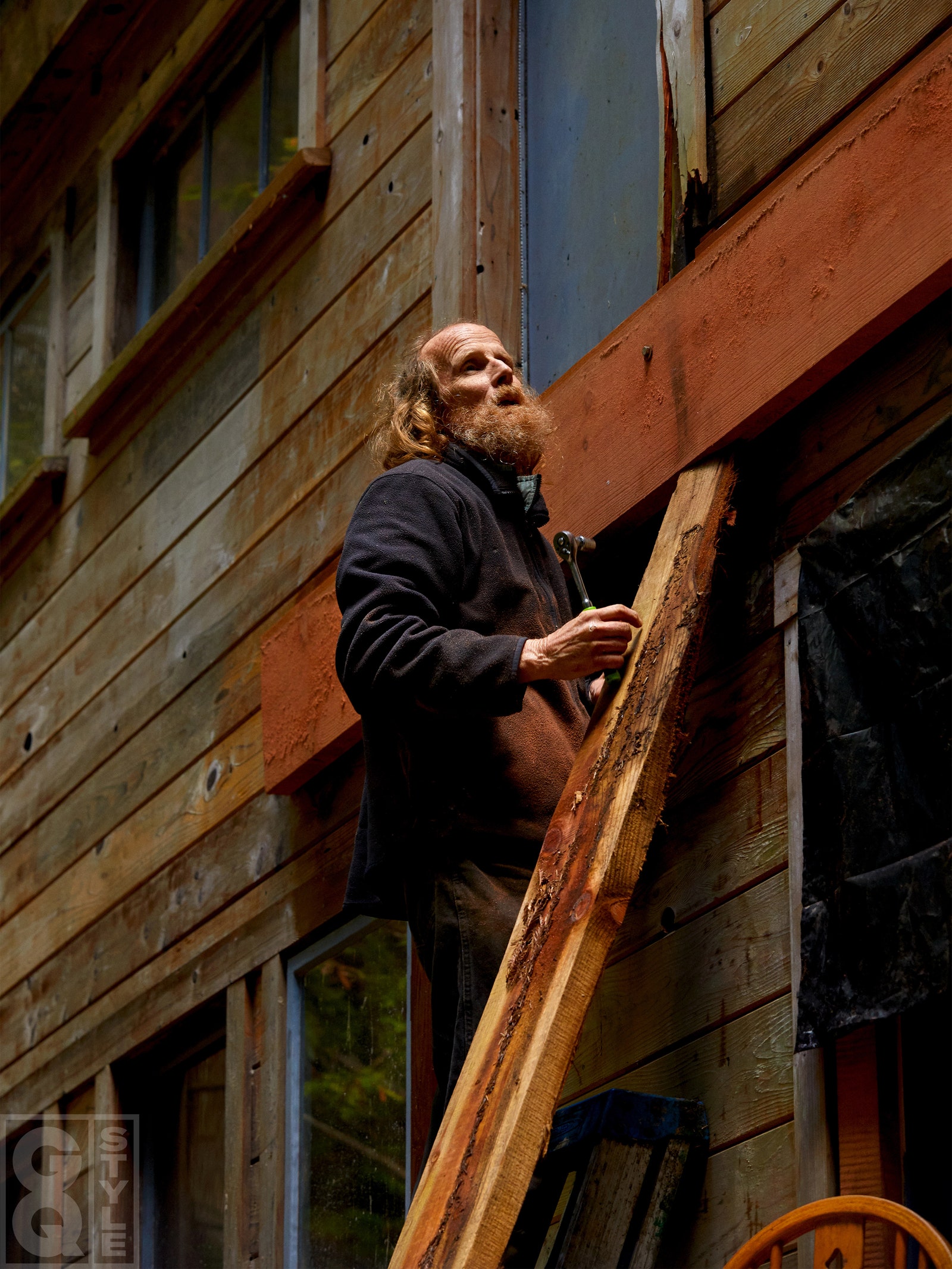There was an aphorism in the movement: “Bad roads make good communes.” And the road we're on today is bad. Several miles inland from California's foggy coastline, we're driving down a
single lane hemmed in by 50-foot fir trees and then turn onto a rocky dirt path, joggling our rented SUV. Photographer Michael Schmelling and I are in Mendocino County, about a three-hour drive north of San Francisco, looking for what remains of perhaps the most famous of the hundreds of rural communes established across Northern California in the late '60s and '70s: Table Mountain Ranch.
The entire expanse—which once was a kind of American Arcadia, home to scores of hippies who'd fled San Francisco to live a new, idealistic kind of life—now looks deserted. We pass tree stumps, logging equipment, and mounds of dirt. The only sound is the chirping of birds. Eventually, in the middle of an open field, we come upon a peeling wood building where a lone man is perched up a ladder. Ascetically thin, with long red hair and a patchy beard, he tells us that he's one of Table Mountain Ranch's last remaining members. Now in his mid-70s, he's wary of supplying his name, wary of being somehow “on the map” after so much time off the grid, so I tell him that I'll refer to him as Jack Berg. Attempting to set the foundation for a second-story balcony, he struggles to balance on the ladder while positioning a two-by-four, an unlit roach in his fingers. As we look on, he brusquely puts us to work, chastising Michael for snapping a picture instead of immediately helping with the load.
Berg is restoring the Whale Schoolhouse, a progressive academy founded in 1971 that became the pride of communards across the Albion region of Northern California. Fifty kids, from elementary to high school age, were enrolled here, but it's sat unused for decades—and now Berg is moving in. “Nobody cared about this building,” he says. “It was disintegrating.” He takes us inside. It's a single room, the size of half a tennis court, with old class pictures on a corkboard. A circular window overlooks an empty field that had long ago been a playground.
One of the last remaining residents of Table Mountain repairs an old schoolhouse.
At one point in 1970, Table Mountain had over a hundred residents, some living in tipis, some in cabins, some crashing in the open air. It appears that before it became a commune, the 120-acre property had been a dude ranch, and the cabins and outbuildings were constantly being expanded in an endless ad hoc construction project. Residents scavenged materials from an abandoned hotel in nearby Fort Bragg and chicken coops from a Jewish communist chicken farm a few hours' drive south, in Petaluma. The living was primitive: There was no electricity or telephone lines, and the toilets were compostable. Residents shared their money and meals. This was the vision of one of Table Mountain's founders, a former Navy pilot named Walter Schneider, who discovered the deforested property from the air and, according to Berg, purchased the plot with cash he made trafficking pot via plane—and with his friend's inheritance. Countercultural luminaries moved up from the Bay, like Allen Cohen, founder of Haight-Ashbury's foremost underground newspaper, The San Francisco Oracle. A close friend of Timothy Leary's, Schneider brought the famed professor for weekend visits. “Walter and Tim came up here looking for a place to drop acid,” Berg explains, “to retreat from the city and do their thing.”
Berg first came to Table Mountain Ranch to visit his sister, then a resident, and never left. He doesn't remember precisely when that was, just that it was around the time Schneider finally got arrested for smuggling weed. Berg didn't know it then, but when he joined the commune he became part of the greatest urban exodus in American history. From the late '60s to the mid '70s, nearly a million young people went back to the land. Nowhere was the urge to reconnect with nature more keenly felt than in San Francisco, where droves of young people were suddenly fleeing a city overrun by heroin, speed, and bad vibes. Cops were shooting down Black Panthers in Oakland and the military was tear-gassing students in People's Park in Berkeley. Vietnam veterans were looking for a salve for their PTSD. Faithful Marxists aimed to put their ideals to the test. Some just wanted to get high in the woods.

